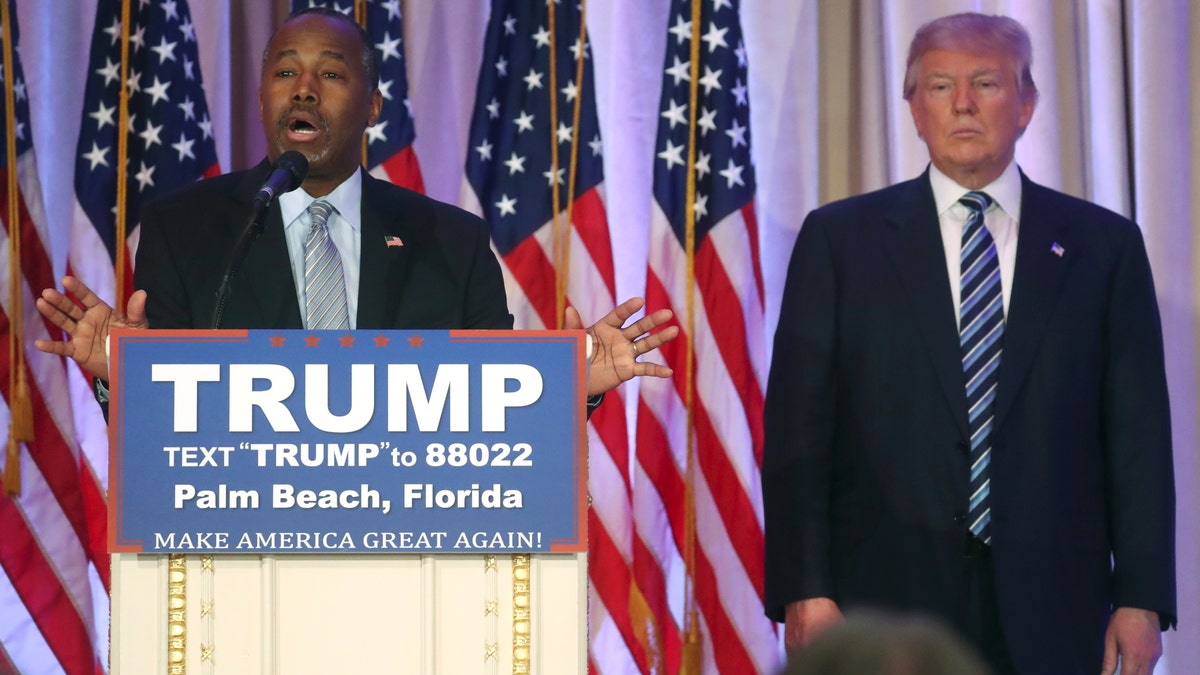
March 11, 2016: Former Republican U.S. presidential candidate Ben Carson endorses Donald Trump. (Reuters)
EDITOR’S NOTE: This column is the second in a series of four columns this week examining how Trump’s health care plan, which will be referred to as THP, may look under his new leadership based on statements he has made and policymakers he has aligned himself with for his transition team and administration.
Dr. Ben Carson, a retired pediatric neurosurgeon and former Republican presidential candidate who was appointed vice chairman of President-elect Donald Trump’s transition team, turned down consideration to be a part of Trump's cabinet but will likely continue to be a key player in shaping his health care plan (THP). Carson, who once referred to ObamaCare as “the worst thing to happen to America since slavery,” has repeatedly called for less government involvement between patients and health care providers, as well as expanded use of health savings accounts.
Carson began making headlines in 2013, when at the National Prayer Breakfast he criticized the Obama Administration’s Affordable Care Act with the president seated just a few people away. He believes the statute has allowed the government to dictate the will of the people. Since then, Carson has become as well-known for his off-the-cuff quips as he is for his medical accomplishments, including the successful separation of conjoined twins. He’s advocated for vaccines and suggested support for legislation similar to Death with Dignity, citing a quadriplegic patient he once treated.
On matters of health care reform, Carson has pushed for a new plan to be in place before ObamaCare is dismantled, and has hinted that some general agreements among the party have already been reached. He favors the expanded use of health savings accounts, which he said is already working well in some states, and has commended lawmakers in the House and Senate who have put forth their own health plans. He floated a proposal for a health empowerment account, which starts at birth and can be passed on after death.
“When a person is born, give him a birth certificate, an electronic medical record, and a health-savings account to which money can be contributed – pretax – from the time you’re born till the time you die. If you die, you can pass it on to your family members, so that when you’re 85 years old and you got six diseases, you’re not trying to spend up everything. You’re happy to pass it on and there’s nobody talking about death panels,” he explained.
Under Carson’s proposal, each family would act as their own insurer, with the ability to shift money from one member within the account to another to cover an individual’s needs. His vision includes provisions for the wealthy to make contributions toward poor individuals’ accounts each month, rather than have the government takeover. Individuals would also be able to purchase catastrophic health care, which he believes over time would still cost families less than the amount charged for current plans.
He has been criticized in the media and accused of wanting to abolish Medicare, but he’s dismissed those claims and said he wouldn’t want to get rid of Medicare altogether, but rather allow people to opt out of it. For those who choose to opt out, Carson’s plan would give them to option to transition it into the family health savings account so that the individual has control and ability to contribute more than an employer. Under Carson’s vision, the same dollars that would be given to patients through Medicare would go into the health savings account, unless the individual chooses to opt-in to Medicare. The overall goal of his plan, he has said, is to eliminate the need for people to be dependent on government programs.
While I’m uncertain if Carson’s vision for health empowerment accounts will come to fruition, it appears likely that THP will include provisions for a health care spending account. Similar to Gingrich, Carson is in favor of an insured nation, and has been vocal about the need for Medicare reform. While he may lack political experience, he has the insight of what works best in the exam room which will prove vital to THP. I look forward to the day when health care is less about what the government tells me I can provide my patients with, and more about providing my patients with what they need.
